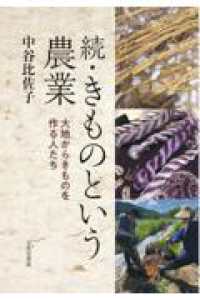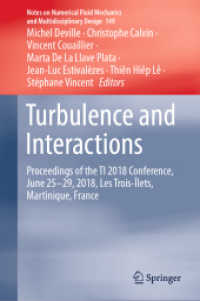- ホーム
- > 洋書
- > 英文書
- > Business / Economics
Full Description
This proceedings volume explores the socio-economic dimension of the heritage sector from a broad, interdisciplinary perspective. Featuring contributions from the 2016 ALECTOR International Conference held in Istanbul, Turkey, this book presents current theoretical and empirical research related to such topics as: R&D and ICT in tourism; heritage products and services; climate change; finance and tourism; cultural communication; anthropological cultural heritage; and heritage management. Collectively, the papers presented in this book provides methodologies, strategies and applications to measure the socio-economic dimension of the heritage sector and also good practices in the heritage sector that drive regional, cultural and economic development and sustainability.
The EU Neighbourhood Info Centre (ENPI) Cross-Border Cooperation (CBC) Black Sea project "Collaborative Networks of Multilevel Actors to Advance Quality Standards for Heritage Tourism at Cross BorderLevel", or ALECTOR, focuses on different types of heritage assets as a means to invest in human capital and tourism innovation in order to achieve socio-economic development and cooperation with social partners in the Black Sea region. Featuring collaborations from Greece, Romania, Bulgaria, Moldova Ukraine, Georgia and Turkey, the project proposes a cognitive and educational framework for using a region's assets, which would guide final beneficiaries (regions, communities, SMEs) to identify, signify, valorize and manage their natural and cultural resources, in order to use heritage potential as a vehicle for tourism.
Presenting case studies of successful initiatives, the enclosed papers are divided into two parts:
• Part I: Economics of Heritage features innovative research results on the heritage and tourism topics from countries such as Bulgaria, Croatia, Russia, and Romania
• Part II: Best Practices features best practices, experiences, and promotion plans for cultural heritage through tourism from countries such as Bulgaria, Republic of Moldova, Turkey, Russia, and Romania
Contents
Part I: Economics of Heritage.- Chapter 1 Cultural heritage management and the sustainable development requirements.- Chapter 2 Multisensory experiences at heritage places.- Chapter 3 Heritage Tourism and Neo-Endogenous Development.- Chapter 4: Information services industry in tourism.- Chapter 5 The National Heritage of Călimani Mountains.- Chapter 6 Statistical correlation between tourism and poverty in EU countries.- Chapter 7 Patterns in Romanian tourism activity.- Chapter 8 Tourists attitudes towards autochthonous product quality and placement.- Chapter 9 financing tourism companies through capital market.- Chapter 10 Stressing the urge for awareness of climate change's impact on natural and cultural heritage.- Chapter 11 Generation Y: Challenges for heritage planning.- Chapter 12 Heritage component of sustainable development.- Chapter 13 Cultural heritage, cultural tourism and creative economy basis for social and economic development.- Chapter 14 Design and delivery of experience-based tourism products and services in heritage settings.- Chapter 15 The global heritage: Knowledge and innovations.- Chapter 16 Smart specialization in supporting SMEs in the tourism sector through innovative clusters.- Chapter 17 Challenges and innovations in sustainable forest management in Romania.- Chapter 18 Public cultural heritage and private property rights.- Chapter 19 Protection of natural heritage: A conservation criminology perspective.- Chapter 20 Development of Romanian corporate governance in hospitality industry.- Chapter 21 Importance and perspectives of protected area in Romania.- Chapter 22 Training for heritage promotion in rural areas.- Chapter 23 Employment profile in tourism sector in Romania.- Chapter 24 Cultural heritage tourism export and local development.- Chapter 25 Weather risk management`s instruments used in tourism industry.- Chapter 26 Social innovation, a key driver for cultural sustainability.- Chapter 27 From smart cities to smart buildings : Tools for promoting cultural heritage.- Part II: Best Practices.- Chapter 1 The importance of using new technologies in museums.- Chapter 2 The trail of the Romania ancient history at the Black Sea Coast.- Chapter 3 Financing instruments for the tourism and agrotourism in Romania.- Chapter 4 Hagia Sophia Soup-Kitchen furnishing exhibition project.- Chapter 5 Cultural tourism and the stimulators RDI and ICT for its development.- Chapter 6 Cultural heritage of Beysehir from XI Century until today.- Chapter 7 Sustainable tourism as a factor in the successful development of the regional economy.- Chapter 8 Efficiency of cultural routes.- Chapter 9 Museums of the future and evolution strategies.- Chapter 10 Cultural symbols in the context of communication.








